The Ultimate Guide to Choosing a Privacy Fence for Your Home
- Table Of Contents
- What Does a Privacy Fence Mean?
- Key Factors In Choosing a Type of Privacy Fence
- What are the Different Types of Privacy Fence Materials
- What are the Most Common Types of Privacy Fences?
- Benefits of Privacy Fencing over Regular Other Fences
- Privacy Fencing Considerations Before Installing
- Professional Fence Installation vs. DIY Installation
- Professional Installation Guarantees Strength, Safety, and Aesthetics
- FAQs
Selecting a privacy fence for your home involves more than just aesthetics; it's about security, functionality, and enhancing your outdoor space. The choice of fencing, style, and installation method can significantly impact the effectiveness and longevity of your privacy fence.
However, the process can be overwhelming with the multitude of options available and the big decision to totally cut off your property, or parts of it, from the surrounding environment. Understanding your needs, considering maintenance requirements, and evaluating the overall costs are essential factors Stand Strong Fencing can help you with.
We'll help you pick the perfect privacy fence. At the same time, you’ll discover invaluable insights to guide you toward making a well-informed decision that aligns with your home's unique requirements and style preferences.
What Does a Privacy Fence Mean?
A privacy fence is a type of barrier that is designed to prevent outsiders from seeing into your property. It offers seclusion and security, distinguishing it from a regular or traditional picket fence, which mainly focuses on security without necessarily providing privacy.
You won't see any gaps in this type of fence, at least not as much as in regular ones with full opacity, and your neighbor can mostly make out what's going on. Some privacy fence designs allow for some opacity, like wooden fences with their fence planks or slats slightly apart, but it's up to the owner.
Key Factors In Choosing a Type of Privacy Fence
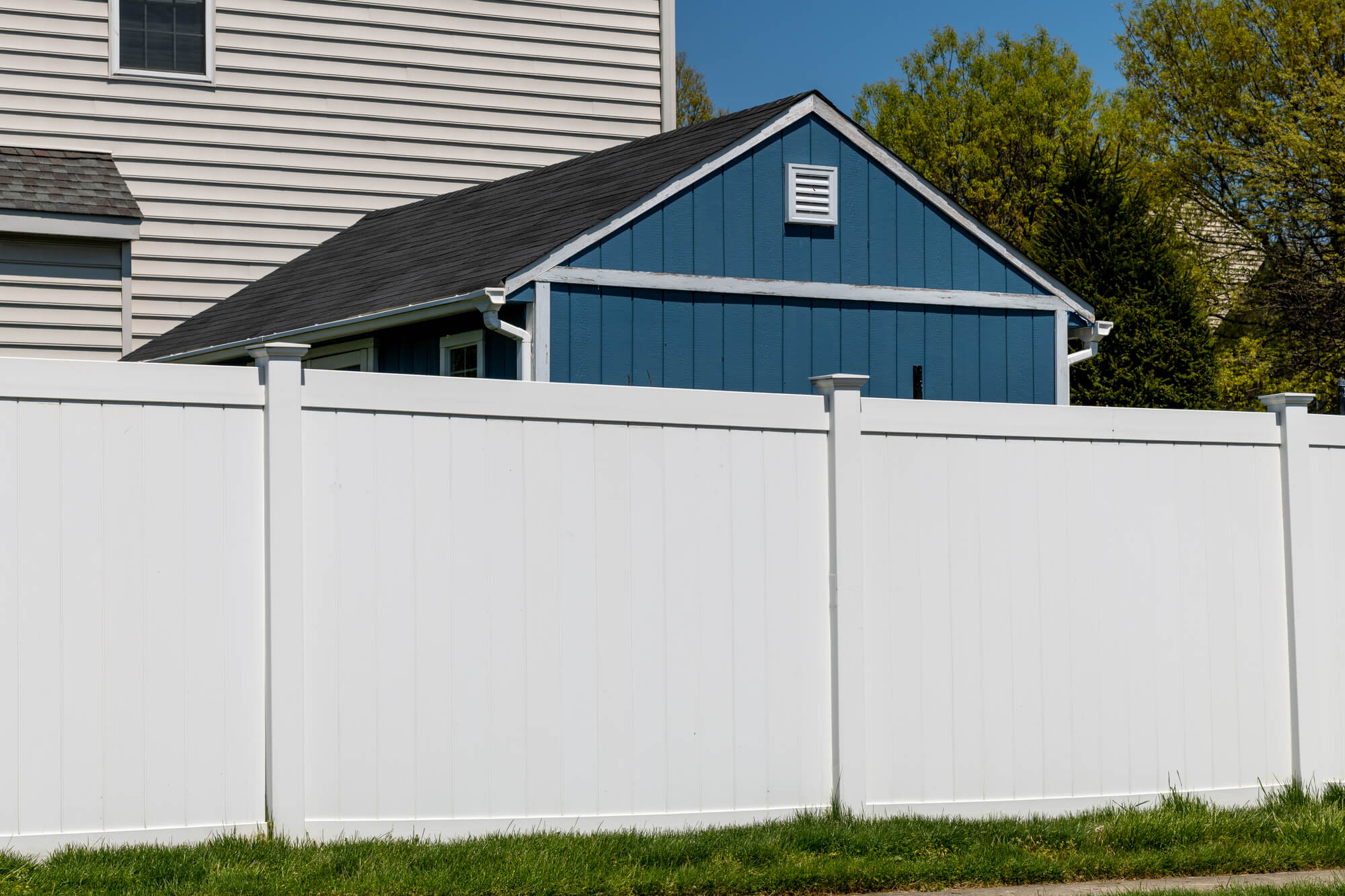
When choosing a type of privacy fence, it is crucial to consider the purpose of the fence. Will it be in the front or back yard? What is the desired level of privacy? Who will be responsible for the installation? What are the best materials for your case?
These key factors will help you make an informed decision that meets your specific needs and preferences for your home.
Purpose of Fence
Considering the intended function of your fence is pivotal when selecting the most suitable type of privacy fence for your home. For many homeowners, a privacy fence serves as a boundary marker, delineating their property lines and creating a safe and secure backyard or outdoor living space.
Privacy fences are designed to shield your yard from prying eyes, providing a sense of seclusion and solitude. They offer a sanctuary where you can relax, entertain, and enjoy outdoor activities without worrying about intrusion. Moreover, they can also offer peace of mind for pet owners who don't have to worry about their small dog or cat slipping through the panels.
When choosing a privacy fence, it's essential to prioritize your need for privacy while also considering the aesthetic appeal and durability of the materials used. This balance ensures that your fence not only serves its purpose but also enhances the overall look and feel of your property.
Front or Backyard Location
When considering the location of your fence, think about the primary purpose of the fence in that specific area.
For instance, if you are looking for privacy and security, then you might have to go with a backyard wood privacy fence, creating a secluded retreat for you and your family. On the other hand, for the front yard, where curb appeal and aesthetics are essential, you may opt for a more decorative fence that still offers some level of privacy without completely obstructing the view.
Choose a fence that complements the overall look and feel of your home and neighborhood.
Privacy Level
Privacy level is a key factor to carefully evaluate when selecting the most suitable type of privacy fence for your home. The privacy level offered by a fence is determined by factors such as the height of the fence and the materials used. Taller fences, such as those made of wood or vinyl, provide better privacy compared to shorter options.
When considering privacy, also think about the spacing between slats or panels in the chosen fencing materials. Wood fences can be customized for optimal privacy by selecting boards without gaps. PVC and vinyl fencing also offer a solid barrier that ensures privacy while offering design versatility and safety. By choosing the appropriate height and materials, you can create a private oasis in your outdoor space.
Local & HOA Regulations
Adhering to local building codes and HOA regulations is crucial when selecting a type of privacy fence for your property. Many neighborhoods have specific guidelines regarding the height, material, and design of fences. Before making a decision, it's essential to check with your local municipality or homeowners association to ensure that your chosen fence complies with these regulations.
Failure to follow these rules could result in fines or the need to remove the fence altogether.
Who’s Installing?
When selecting the most suitable type of privacy fence for your home, one crucial aspect to consider is the expertise and reliability of the individuals or companies responsible for the installation. Entrusting your fence project to skilled professionals ensures a smooth and efficient process, giving you peace of mind that the job will be done correctly.
In addition, reputable installers like those at Stand Strong Fencing can provide valuable insights into the different options available, guiding you toward the best choice for your specific needs. Before proceeding with the installation, it's essential to check whether a building permit is required for your chosen fence type, as this can vary depending on local regulations.
Types of Materials
Considering the durability and aesthetic appeal of the fencing materials is crucial when selecting the most suitable type of privacy fence for your home.
Wood fences offer a traditional and natural look that can blend seamlessly with various outdoor landscapes.
PVC & vinyl fences are low-maintenance options that provide a modern and sleek appearance, ideal for those seeking a contemporary feel.
Solid fences, whether made of wood or PVC & vinyl, offer maximum privacy and security, making them perfect for creating a secluded oasis in your backyard.
However, you can also find metal privacy fences for extra durability and protection, although these are less common for residential properties, being used mostly for commercial ones. They typically come in the form of corrugated metal fences.
Composite materials are also a newer and versatile material that is increasingly in demand. They can be molded and manufactured to imitate practically any material, are durable, and customizable.
Stone fences are another option you will find on the market. However, take in mind they're much more expensive to install and are typically used as retaining walls, not solely privacy fencing. They might also not be as compatible with your property's or neighborhood's aesthetic.
Each material has its unique advantages, so it's essential to weigh factors such as maintenance requirements, longevity, and design preferences when deciding on the best privacy fence for your home.
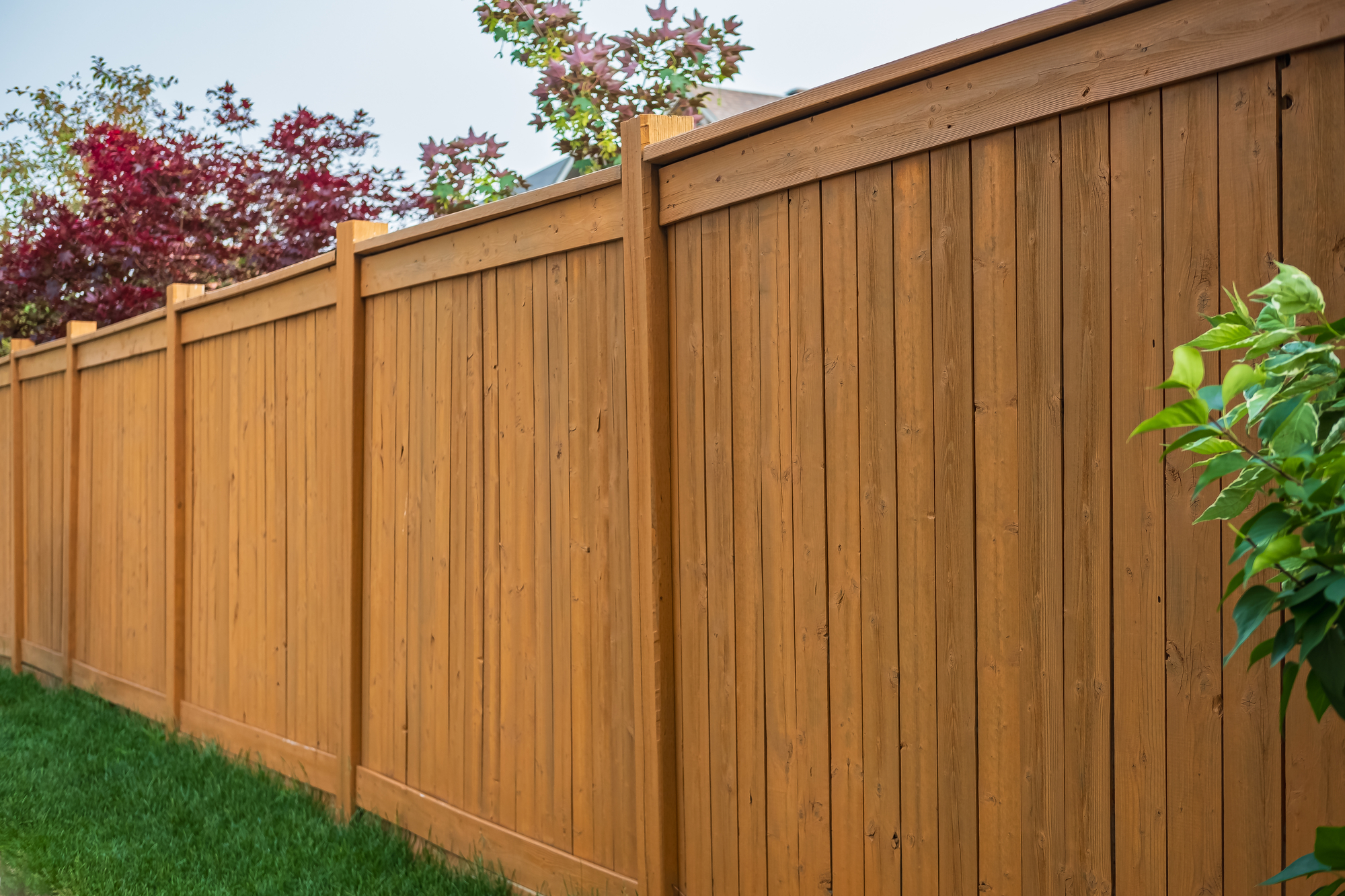
Height of Your Fence
The height of your fence plays a significant role in providing the level of privacy and security you desire.
Taller fences, typically ranging from 6 to 8 feet, offer better privacy and deter potential intruders. However, local regulations may limit the maximum height allowed for fences in residential areas, and you might later regret being completely engulfed by walls on either side.
Design & Aesthetics
If a privacy fence were only about security and solitude, then a concrete wall would do the job, but that's not really what most are looking for in privacy fence ideas. The aesthetics of a privacy fence are vital in enhancing the overall appearance and appeal of your property, making it essential to carefully consider the design elements when selecting the most suitable type for your home.
This is why wooden privacy fences are among the most popular fence styles, as they balance security, privacy, and aesthetics really well, along with being affordable. Additionally, the design of the fence can either blend seamlessly with your surroundings or stand out as a statement piece on its own.
Ultimately, make a choice that not only provides the privacy you seek but also adds to the beauty and charm of your home.
Impact on Neighbors
Choosing the type of privacy fence for your home requires thoughtful consideration of its potential impact on your neighbors. It's essential to respect property lines and adhere to any local fence regulations or rules regarding height and placement.
Open communication with your neighbors about your fencing plans can help alleviate any concerns they may have about the impact on their property or views. They might not want post holes endangering their own property or utility lines.
So, opting for a fence that enhances the overall aesthetic of the neighborhood can promote a sense of harmony and community.
Additionally, choosing a design that provides privacy without creating a fortress-like appearance can ensure that your neighbors feel included rather than excluded, maintaining positive relationships with those living nearby.
Durability & Weather Resistance
Prioritize durability and weather resistance to ensure a long-lasting and reliable solution for your property, particularly if the climate in your area is prone to extremes.
For example, vinyl fences are known for their weather resistance and low maintenance requirements. Aluminum fence panels can also deliver durability, but they won't be aesthetically pleasing to most homeowners. Wood is among the most popular choices, but it can be harder to maintain in very rainy or coastal environments.
Additionally, ensure that the fence is installed securely with the use of quality screws and proper post-hole placement to enhance its durability against various weather conditions.
Consider the placement of fence posts and stakes to ensure stability and durability. Properly installed fence posts at the right height will contribute to the overall effectiveness and longevity of your privacy fence, providing you with a barrier that gives you a sense of security and belonging.
Security Features
Carefully evaluate the security features offered by different types of privacy fences before making a selection.
When considering security features, look for fences that are at least six feet tall to deter intruders from easily climbing over. Additionally, fence pickets with sharp pointed tops or finials can act as a deterrent.
Incorporating gravel along the base of the fence can make it harder for trespassers to approach silently.
For added security, consider using nails or screws instead of easily removable fasteners to assemble the fence.
Environment Impact
Considering the environmental impact is important when selecting the most suitable type of privacy fence for your property. Opting for sustainable materials like bamboo or recycled wood can lessen the ecological footprint of your fence. Recycled wood reduces the demand for new timber, while the bamboo for bamboo fences grows quickly. However, they might not be able to offer enough privacy, and this is not a material available in many regions.
Another eco-friendly option is composite fencing, which combines wood fibers with recycled plastic for a durable and low-maintenance alternative. Additionally, choosing a local supplier can decrease transportation emissions. Brands like Fencetrac, Trex, and SimTek are among the leaders in this new type of fencing.
Maintenance
Different types of privacy fences come with varying levels of maintenance needs.
Wood fences, for instance, require regular staining or painting to protect them from the elements and keep them looking their best. On the other hand, PVC and vinyl fences are relatively low maintenance, only needing occasional cleaning with soap and water to maintain their appearance.
Aluminum and steel fencing will also require some special cleaning and paint to avoid staining and rust (in the case of steel), and dents and damage are more costly to fix. Moving metal parts in any fence will also require constant lubrication.
And on any fence, either metal or wood, vegetation is bound to scratch, dent, or corrode the fence over time.
Considering your desired level of involvement in upkeep is crucial when deciding on the type of privacy fence that best suits your needs.
Cost of Your Fence
Taking into account the maintenance considerations discussed earlier, an important aspect to weigh when deciding on the type of privacy fence for your property is the cost associated with your choice. The cost of your fence will depend on various factors, such as the material used, the size of your property, and any additional features you may want to include.
Wood is generally more affordable upfront but may require more maintenance over time, and its price will vary depending on the region. PVC or vinyl fences tend to have a higher initial cost but lower maintenance expenses in the long run.
Metal fencing also can represent higher initial costs, but maintenance is much lower in the long run, especially with aluminum.
Labor costs in your city or state are another major factor when deciding how to install your privacy fence. It’s an often overlooked component of your project’s cost and should be considered before deciding on that higher-end material or fence style, for example.
It's essential to consider not just the initial installation cost but also the long-term expenses to ensure that you choose a privacy fence that fits within your budget and provides value for your investment.
Well-established, trustworthy teams like Stand Strong Fencing will likely give you more competitive estimates with options for customization to fit your priorities and budget.
What are the Different Types of Privacy Fence Materials
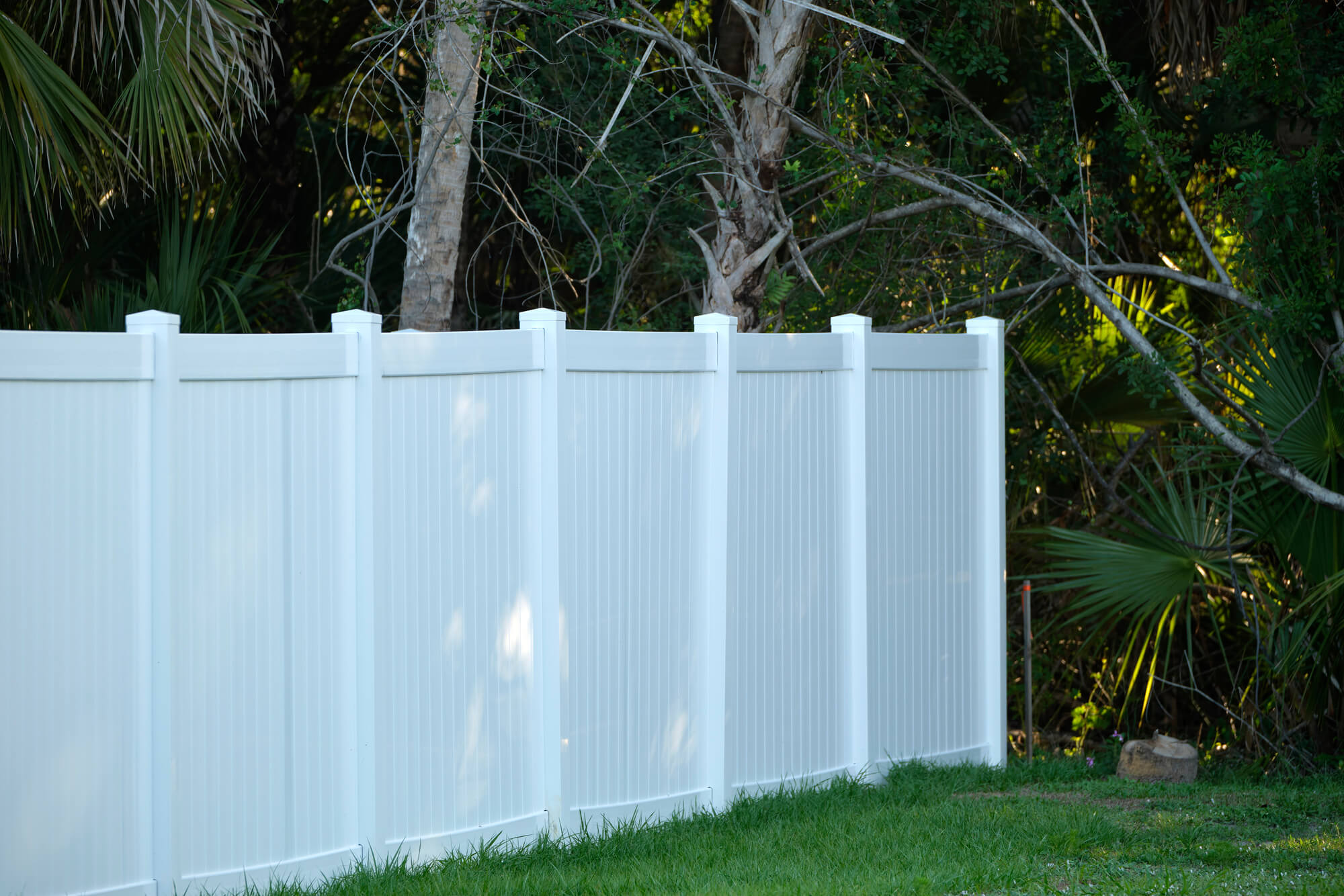
When considering privacy fence materials, homeowners often opt for wood for its classic and natural look. PVC and vinyl are chosen for their low maintenance and durability. Metal is selected for a sleek and modern aesthetic. And new materials like composite are creating a lot of buzz in the industry. Each material offers distinct advantages and can cater to different preferences in terms of style, upkeep, and longevity. We're here to break those down for you:
Wood Privacy Fences
Wood privacy fences are a popular choice for homeowners seeking a natural and classic look for their property. With many types of wood materials available, they offer benefits such as durability, versatility in design, and the ability to blend seamlessly into different landscapes.
Benefits of a Wood Fence
Natural Beauty: Wood radiates a sense of natural beauty and warmth, elevating the visual charm of any property.
Versatile Design: Easily tailored to complement a range of architectural styles, offering homeowners a flexible design platform.
Environmentally Friendly: Wood is biodegradable and eco-friendly, being a renewable resource that promotes sustainability.
Budget-Friendly: Generally more cost-effective initially than certain alternative fencing materials.
They also provide sound insulation, security, and durability, making them an excellent choice for homeowners seeking a classic and reliable fencing option.
PVC & Vinyl Privacy Fences
When considering privacy fencing options, PVC and vinyl fences stand out due to their durability, low maintenance needs, and resistance to rot, decay, and pests.
These materials offer a sleek and modern aesthetic that can enhance the overall look of your property while providing long-lasting privacy and security. You'll see vinyl fencing everywhere in both commercial and residential properties.
Benefits of PVC and Vinyl Fence
Low Maintenance: Say goodbye to painting or staining, forget about stubborn stains, and worry less about overall maintenance.
Durability and Longevity: It's resistant to pests, rot, and rust, ensuring a longer lifespan for your investment.
Design Versatility: Vinyl fencing offers a wide range of styles and colors to match any aesthetic preference.
Safety First: With vinyl, there's no need to worry about splinters, sharp edges, or easy breakage, ensuring a safe environment for kids, pets, and yourself.
Environmentally Friendly: Vinyl privacy fence materials are fully recyclable, allowing for repurposing into new products at the end of their life cycle.
Metal Privacy Fences
Metal privacy fences are rarer for residential properties and more common for commercial properties. Nonetheless, they provide various options for property owners seeking security, durability, and seclusion. In this case, metal privacy fences can refer to either aluminum, steel, chain-link, or wrought iron fences.
In the case of most metal fences, the entire fence would have to be made out of metal panels or a combination of metal, plastic, or even wood.
Aluminum
Aluminum stands out as a durable and versatile choice for any property owner looking to enhance the security and aesthetics of their property.
Aluminum privacy fences usually come in the form of lightweight horizontal or vertical panels, making them low-maintenance and resistant to rust and corrosion. They're a recent popular choice for those seeking a sleek and modern look for their outdoor space.
Steel
When considering privacy fence materials, steel emerges as a robust option for homeowners seeking durability and security for their property.
They come in the form of panels, known for their strength and resistance to harsh weather conditions, making them a long-lasting investment for those looking to enhance the privacy and protection of their homes. They can also be used as elegant and sturdy fence posts for wood or vinyl fences.
Chain Link
Chain link fences are durable and low-maintenance, providing a sturdy barrier while allowing visibility.
They come in various heights and can be customized with plastic privacy slats for increased seclusion, but they are also an option for those who want the plants in their backyard garden to offer privacy. Chain link fences are great for wrap-around vines, bushes, tall shrubs, and other plants to take hold, making them a practical choice for those looking to secure their property without compromising on affordability.
Composite Fences
Privacy fences made out of composite materials are relatively new on the market, and they offer a range of benefits for homeowners seeking both aesthetic appeal and functionality.
Durable
Resistant to rot, warping, insect damage.
Minimal maintenance.
Optimal for noise reduction.
Can be molded to mimic wood, rock, and other materials and styles.
The solid construction of composite materials also ensures optimal privacy and noise reduction, creating a peaceful and secure outdoor space for relaxation and entertainment. With a variety of style and color options available, composite privacy fences can enhance the overall look of a property while offering long-lasting protection and privacy.
What are the Most Common Types of Privacy Fences?
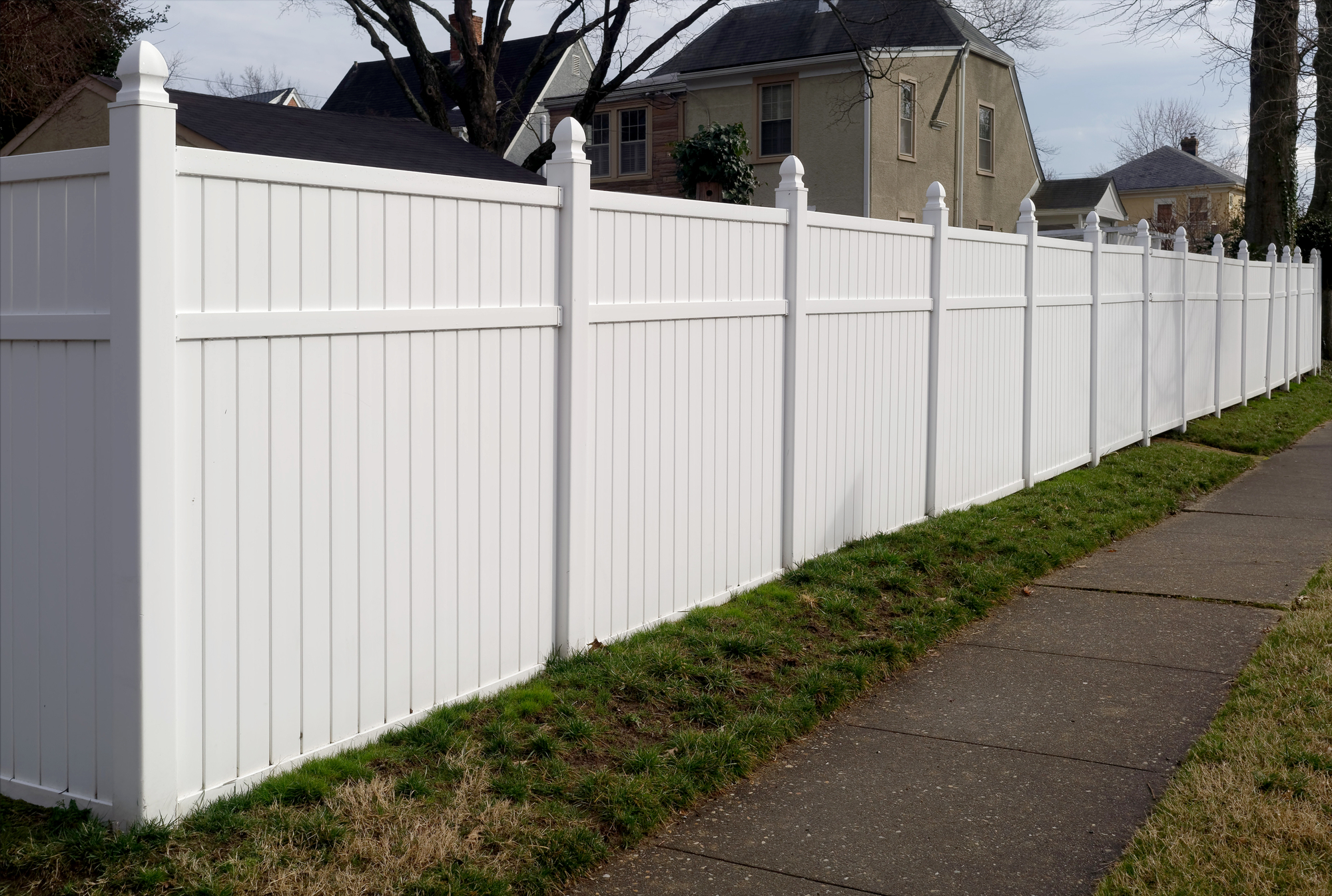
When it comes to privacy, there is a wide variety of popular types of fences and designs that emerge as go-to choices for homeowners seeking to enhance both the aesthetic appeal and privacy of their properties.
Wood Styles
Horizontal privacy fence: If you're looking for a modern look to your front or backyard area, many homeowners are going with horizontal panes. It can create a unique juxtaposition with your plants on your fence line or other vertical elements in your outdoor space.
Dog Eared: The top of the slats look like their name: dog ears. It's a smoother look than traditional picket slats.
Cap & Trim: These slats or panels have a "cap" or top cover. It's an elegant look that mimics retaining walls but with wood.
Board-on-board fence designs, where wooden boards are slightly overlapping on either side of the supporting rail, offer complete privacy and complete seclusion as well as a sturdy structure..
Board-and-Stringer Fence, where vertical boards that are attached to horizontal support fence rails are known as stringers. The boards are typically spaced apart to allow for airflow and visibility, providing a balance of privacy and openness.
Lattice top fences provide a touch of elegance while still maintaining privacy.
Stockade fences are tall, tightly spaced wooden fences that also come with pointed pickets meant for maximum security above all else. They are used in husbandry, farms, and other commercial uses. They're meant to be functional, not visually appealing (although many property owners can certainly find charm in them.)
Shadowbox fences, with alternating panels to create a visually interesting design, offer privacy with a more open feel.
PVC and Vinyl Styles
Solid Privacy: Just like with wood, these are vertical or horizontal slats tightly placed together for more privacy and security.
Solid with Lattice: Similar to their wood counterparts, it's a privacy fence where a lattice board or section covers the top of the slats or panels.
Solid with Spindle: Like the lattice, it's a fence with a decorative accent on top, but with more space for air circulation instead of a lattice pattern or design.
Aluminum
Horizontal or vertical: Compact, tight slats placed either horizontally or vertically. Simple but elegant and modern design thanks to the nature of the material.
Semi-private: An aluminum privacy fence with some spacing between the pickets. The exact design and spacing will vary depending on the brand.
Each of these privacy fence styles brings a unique charm to the property while ensuring a sense of belonging and security for homeowners.
By offering a range of materials and design options, we at Stand Strong Fencing empower homeowners to create a personalized sanctuary that not only meets their practical needs but also enhances the beauty and privacy of their outdoor space.
Benefits of Privacy Fencing over Regular Other Fences
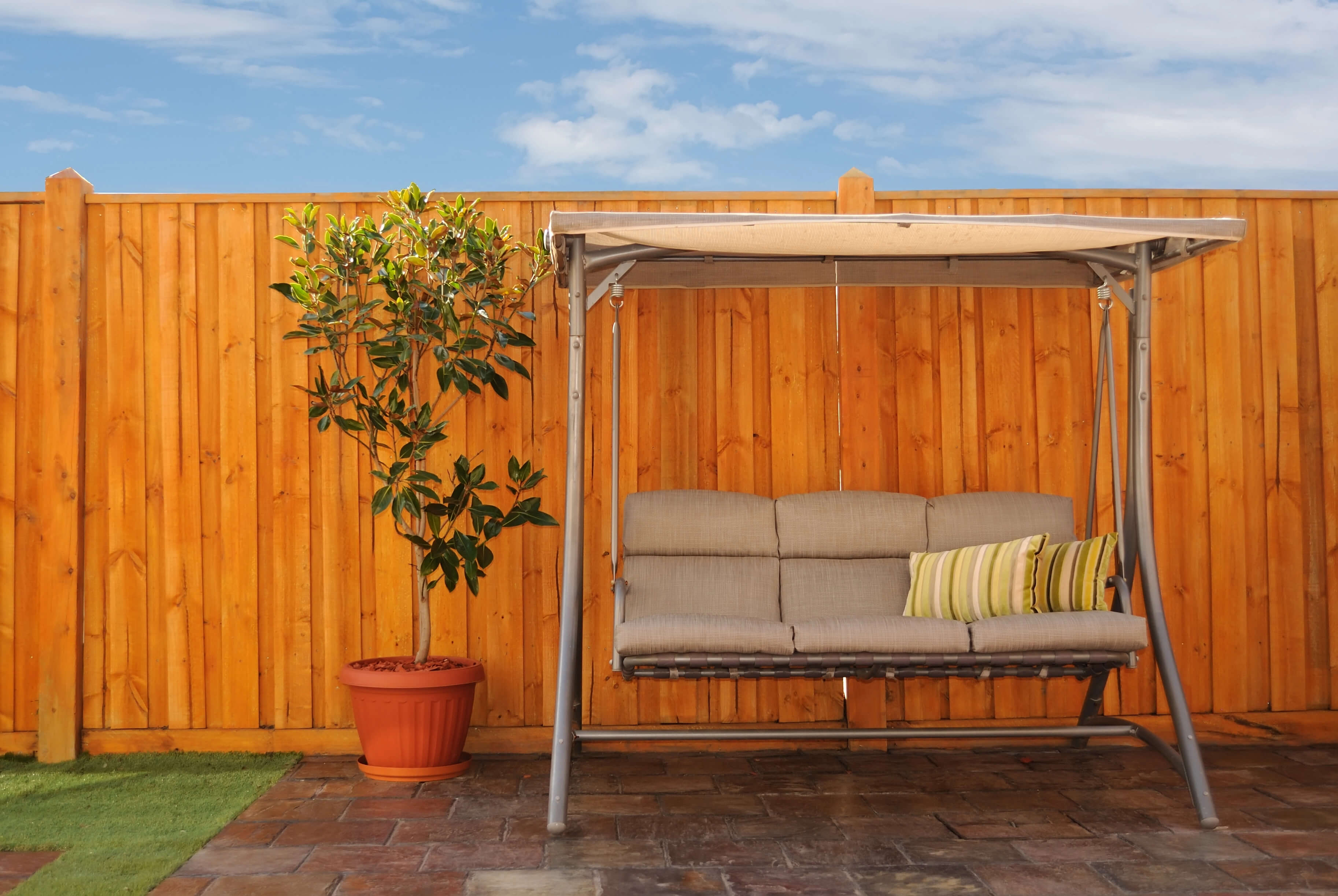
When considering fencing options for their properties, homeowners often prioritize the benefits of privacy fencing over other types of fencing, like a picket fence, due to the enhanced security and seclusion it provides.
1. Creating a Private Sanctuary
Privacy fences offer a sense of belonging by creating a private sanctuary where families can enjoy gatherings without worrying about prying eyes.
Unlike classic white picket fences, which are more open and allow for visibility both in and out, privacy fences act as a secure barrier against unwanted intrusions and provide a secure environment for children and pets to play freely.
2. Reduces Noise Pollution
Additionally, privacy fences can help reduce noise pollution from the surrounding neighborhood, creating a peaceful and tranquil space for homeowners to relax.
3. Weather Protection
The solid panels of privacy fences also offer protection from harsh weather conditions, maintaining the integrity of the property for years to come.
4. Enhances Aesthetics
Privacy fencing stands out as a superior and ideal choice for homeowners seeking both security and much-needed seclusion in their outdoor spaces while also adding curb appeal and an entirely new aesthetic front or backyard element.
Privacy Fencing Considerations Before Installing
Before installing a privacy fence, there's a checklist to go through before beginning installation. This is something both you, as a homeowner, and your installers need to go through together.
Taking these considerations into account will contribute to a smooth and successful privacy fencing project.
Review Official Property Lines
Ensuring clarity on official property lines is vital before proceeding with your privacy fence installation project to prevent any potential legal disputes or encroachments. To accurately determine property boundaries, obtaining a copy of the land survey or deed from the local county office is recommended.
This documentation will outline the exact dimensions and limits of your property, aiding in the placement of the privacy fence within your rightful boundaries. Engaging a professional surveyor for a property line assessment can offer additional assurance and peace of mind.
Notify Neighbors
Although you likely already consulted with them before deciding on installing a new fence, you must also notify your neighboring property owners about your plans just prior to commencing the installation of a privacy fence.
When neighbors are aware of your plans, they can voice any concerns they may have, such as potential obstructions or property line issues, before the installation begins. This proactive step shows respect for their property and helps foster a sense of community and cooperation.
Check Utility Lines
Make sure no utility lines or pipes are affected by the installation. If you're unsure, you can contact any utility company or the national 811 call-before-you-dig number, and they'll provide you with the necessary information. You don't want your fence hitting that sewage pipe, drain, or internet cable right under your front or back yard.
Professional Fence Installation vs. DIY Installation
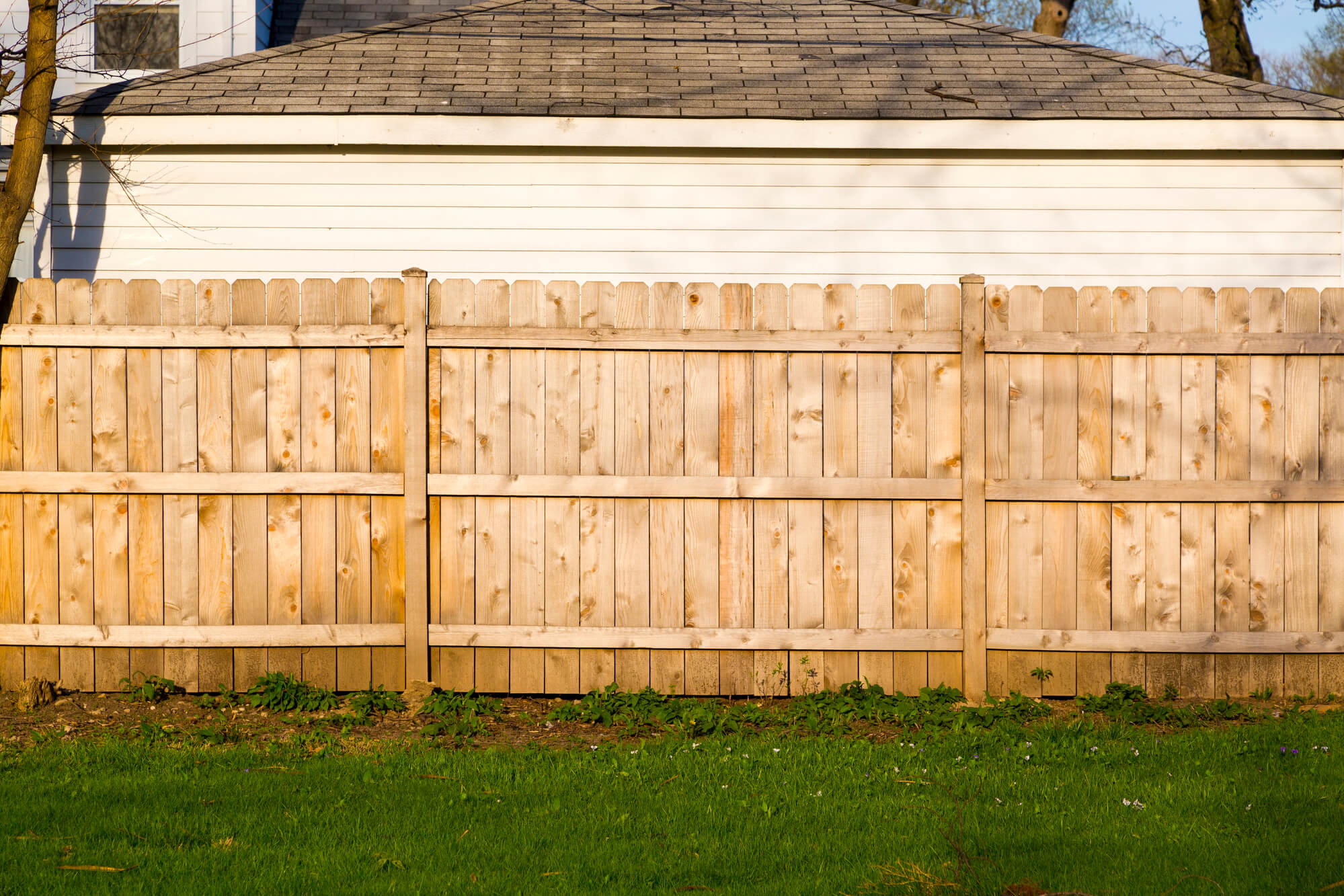
Considering the complexity and durability of privacy fences, the decision between professional fence installation and DIY installation is a crucial factor that homeowners must carefully weigh.
It’s essential to acknowledge the expertise and precision that professional installers bring to the table before believing the myth of saving money with DIY. Professional fence installation ensures that the fence is erected correctly, meets industry standards and local regulations, and, in the end, is actually better for your budget.
Moreover, professionals have the necessary tools and knowledge to navigate any challenges that may arise during the installation process, guaranteeing a smooth and efficient experience for homeowners.
DIY installation may seem like a cost-effective solution, but it often leads to potential errors that could compromise the fence's integrity and longevity. Mistakes made during installation can result in an unstable fence that may require costly repairs in the future. Homeowners also risk getting stuck with tools and machinery they might only need once and won't have a use for again, like a post-hole digger.
An additional cost is the time spent on doing it yourself. Time is money, and professionals will not only save you time but also allow you, as a property owner, to focus on more important aspects of this or any major renovation project.
So, by choosing professional fence contractor, homeowners can rest assured that their privacy fence will be installed with expertise, ensuring both security and aesthetic appeal for years to come.
Professional Installation Guarantees Strength, Safety, and Aesthetics
You've now learned the basics about selecting the right privacy fence for your home, a crucial step for a decision that requires thoughtful consideration of materials, styles, and installation options.
By understanding the benefits and considerations of privacy fencing, homeowners can make informed choices to enhance security, define boundaries, and create secluded outdoor spaces.
A professional fence installation project by experienced professionals from a reputable fence company ensures the strength, safety, and aesthetic appeal of your privacy fence. When you entrust your privacy fence installation to skilled experts like Stand Strong Fencing, you are guaranteeing a sturdy and durable barrier around your property.
Moreover, the aesthetic aspect of your privacy fence is crucial in enhancing the overall look of your property. Our installers at Stand Strong have an eye for detail and can ensure that your fence is installed evenly and in alignment with your landscape, boosting the curb appeal of your home.
Their expertise in selecting the right materials and designs will result in a great-looking addition to your property that complements its surroundings and adds value to your home.
Schedule a Quote to get started on that secure, elegant, privacy fencing of your dreams.
FAQs
Do You Need a Building Permit for a Privacy Fence Project?
Before starting your privacy fence project, it is crucial to determine whether obtaining a building permit is necessary. Building permit requirements vary based on location, so it is essential to check with your local municipal office or building department.
In most cases, if your fence is over a certain height or if you live in a designated historic district, a permit may be required. Failure to obtain the necessary permits can result in fines or even having to remove the fence.
What's the Average Privacy Fence Height?
The average privacy fence height for residential properties ranges from 6 to 8 feet. While some areas may allow taller fences for increased privacy, most neighborhoods adhere to these standard heights.
It's essential to consult your local zoning ordinances or homeowner's association guidelines to determine the specific height limitations in your area. Factors such as property slope, proximity to neighboring houses, and visibility from the street can also influence the acceptable fence height.
How Much Does a Privacy Fence Cost on Average?
The cost of a privacy fence, on average, can vary based on the material, dimensions, and installation requirements. Typically, for a standard 6-foot high wood fence, you can expect to pay between $15 to $30 per linear foot. On the other hand, PVC or vinyl fences can cost anywhere from $20 to $40 per linear foot.
Factors such as the fence's height, design intricacy, and the need for professional installation can also influence the overall cost. It's important to consider long-term maintenance expenses as well when deciding on the type of privacy fence for your home.


